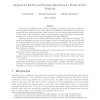Free Online Productivity Tools
i2Speak
i2Symbol
i2OCR
iTex2Img
iWeb2Print
iWeb2Shot
i2Type
iPdf2Split
iPdf2Merge
i2Bopomofo
i2Arabic
i2Style
i2Image
i2PDF
iLatex2Rtf
Sci2ools
116
click to vote
SPAA
2003
ACM
2003
ACM
Analysis of link reversal routing algorithms for mobile ad hoc networks
Link reversal algorithms provide a simple mechanism for routing in mobile ad hoc networks. These algorithms maintain routes to any particular destination in the network, even when the network topology changes frequently. In link reversal, a node reverses its incident links whenever it loses routes to the destination. Link reversal algorithms have been studied experimentally and have been used in practical routing algorithms, including TORA [8]. This paper presents the first formal performance analysis of link reversal algorithms. We study these algorithms in terms of work (number of node reversals) and the time needed until the network stabilizes to a state in which all the routes are reestablished. We focus on the full reversal algorithm and the partial reversal algorithm, both due to Gafni and Berstekas [5]; the first algorithm is simpler, while the latter has been found to be more efficient for typical cases. Our results are as follows: (1) The full reversal algorithm requires O(...
Distributed And Parallel Computing | Link Reversal Algorithm | Partial Reversal Algorithm | Reversal Algorithm | SPAA 2003 |
Related Content
| Added | 05 Jul 2010 |
| Updated | 05 Jul 2010 |
| Type | Conference |
| Year | 2003 |
| Where | SPAA |
| Authors | Costas Busch, Srikanth Surapaneni, Srikanta Tirthapura |
Comments (0)

